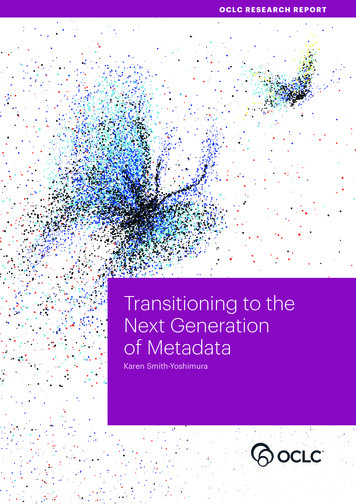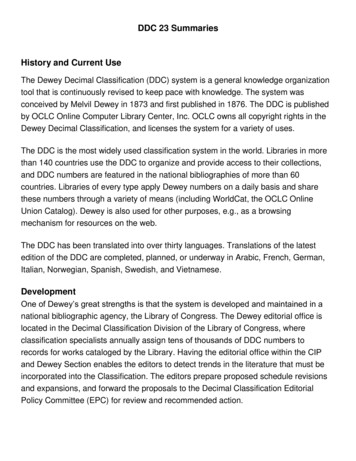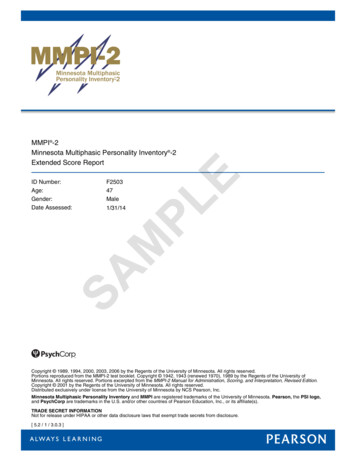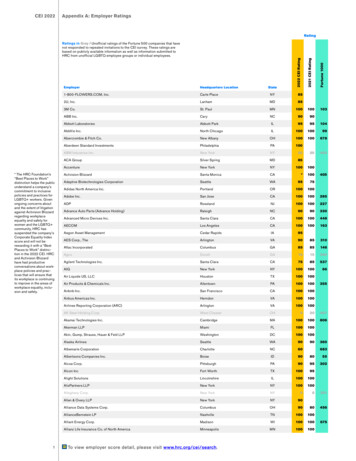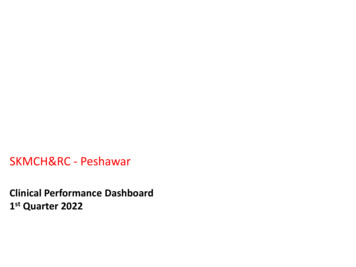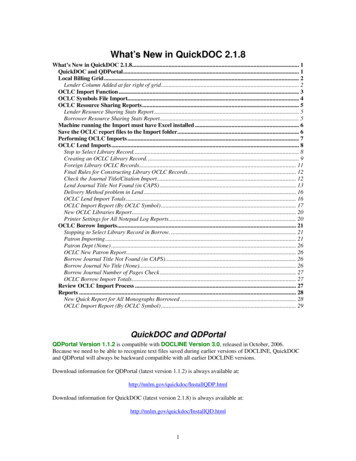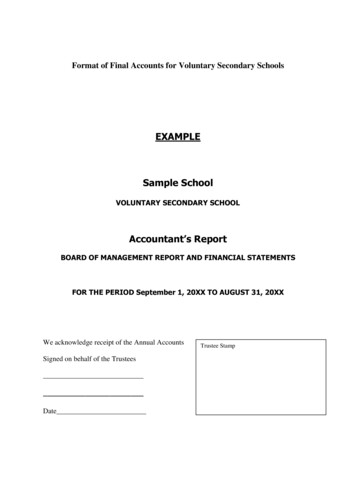
Transcription
100100Philosophy, parapsychology and occultism,psychologyWorks that discuss the discipline of philosophy itself; works that discuss several ofphilosophy’s major questions and branches; comprehensive works on philosophybroad enough to include nonwestern or medieval as well as modern westernphilosophy are classed in 100 itself or 101–109Class comprehensive works on Christian philosophy, on modern philosophy, onwestern philosophy, on modern western philosophy, on European philosophy in190. Class philosophy of a specific subject with the subject, plus notation 01 fromTable 1, e.g., philosophy of history 901See Manual at T1—01; also at 200 vs. tandard subdivisions of philosophyMetaphysicsEpistemology, causation, humankindParapsychology and occultismSpecific philosophical schools and viewpointsPsychologyPhilosophical logicEthics (Moral philosophy)Ancient, medieval, eastern philosophyModern western and other noneastern philosophyTheory of philosophyClass here works on the concept of philosophy, on the nature of the philosophicaltask, on the method of philosophyClass schools of philosophical thought in 140; class ancient, medieval, easternschools in 180102Miscellany of philosophy103Dictionaries, encyclopedias, concordances of philosophy[104][Unassigned]Most recently used in Edition 8105Serial publications of philosophy106Organizations and management of philosophy107Education, research, related topics of philosophy262
108Philosophy, parapsychology and occultism, psychology108Groups of people109History and collected biography108Do not use for geographic treatment; class in 180–190Not limited by period or place.2Collected biographyDo not use for individual persons; class in 180–190110MetaphysicsFor epistemology, causation, humankind, see 120111OntologyIncluding existence, essence, substance, accidents; universals; nonbeing,nothingness; finite and infinite; properties of being (e.g., unity, good and evil,beauty)Class comprehensive works on truth in 121For ethics, see 170. For aesthetics of a specific subject, see the subject, e.g.,aesthetics of the fine arts 701[112][Unassigned]Most recently used in Edition 10113Cosmology (Philosophy of nature)Including cosmic harmony, origin of universe (cosmogony); philosophy of lifeClass origin and nature of human life in 128; class cosmology as a topic inastronomy in 523.1For specific topics of cosmology not provided for here, see 114–119114SpaceClass here relation of space and matterClass matter in 117115TimeIncluding eternity, space and time, space-time, relation of time and motionFor space, see 114116ChangeIncluding becoming, cycles, evolution, motion, processClass relation of time and motion in 115117StructureIncluding matter, form, order, chaosClass relation of space and matter in 114263
118118Dewey Decimal Classification118Force and energyStandard subdivisions are added for either or both topics in heading119Number and quantity120Epistemology, causation, humankind121Epistemology (Theory of knowledge)Including possibility and limits of knowledge; origin, sources, means ofknowledge; structure of knowledge; doubt and denial; nature of inquiry; faith;worth and theory of values (axiology)Class here coherence, correspondence theories of truth; comprehensive works ontruthClass knowledge and its extension in 001; class reason as a human attribute in128; class ethical values in 170; class religious faith in 200; class philosophy oflanguage in linguistics in 401For truth as a classical property of being, see 111; for truth in logic, see 160122CausationClass here chance versus causeFor determinism and indeterminism, see 123; for teleology, see 124123Determinism and indeterminismStandard subdivisions are added for either or both topics in headingIncluding contingency; chance; freedom; necessityClass chance versus cause in 122124TeleologyClass here final cause[125][Unassigned]Most recently used in Edition 10126The selfLimited to topics named belowClass here consciousness of self as person, personal identity, personality,personhoodClass the unconscious and the subconscious in 127; class comprehensive works onconsciousness in 128See also 111 for identity127The unconscious and the subconsciousStandard subdivisions are added for either or both topics in heading264
128Epistemology, causation, humankind128128HumankindIncluding soul; mind; comprehensive works on consciousness; attributes andfaculties; human action and experience; comprehensive works on philosophicalcounseling; human death; bodyClass here philosophical anthropology; comprehensive works on philosophy ofhuman life, on philosophy and psychology of human lifeClass reason as an instrument of knowledge in 121; class interdisciplinary workson death in 306.9For perception, sensation, see 121; for free will, see 123; for the self,consciousness of self as person, see 126; for origin and destiny of individualsouls, see 129; for psychology, see 150; for science of reasoning (logic), see160; for ethics of love, see 177. For collections of texts for philosophicalcounseling clients on a specific subject, see the subject, e.g., a generalcollection of philosophical texts for philosophical counseling clients 100; forphilosophical counseling focusing on specific issues or types of issues, see theissue or type of issue, e.g., philosophical counseling focusing on ethics issues170See also 599.9 for physical anthropology129Origin and destiny of individual soulsIncluding immortality, incarnation, reincarnation, transmigrationClass personal accounts of previous incarnations in 133.9; class interdisciplinaryworks on reincarnation in 202130Parapsychology and occultismStandard subdivisions are added for either or both topics in headingClass here paranormal phenomena, frauds in occultismClass phenomena of religious experience in 200; class interdisciplinary works oncontroversial knowledge and paranormal phenomena in 001.9See Manual at 001.9 and 130; also at 130 vs. 200SUMMARY130.1131133135137138139.1Philosophy and theoryParapsychological and occult methods for achieving well-being, happiness,successSpecific topics in parapsychology and occultismDreams and mysteriesDivinatory graphologyPhysiognomyPhrenologyPhilosophy and theoryDo not use for comprehensive works on parapsychological and occultforecasting and forecasts; class in 133.3Class a specific type of forecasting or forecast with the type, without addingnotation 01 from Table 1, e.g., astrological methods of forecasting 133.5265
131Dewey Decimal Classification131Parapsychological and occult methods for achievingwell-being, happiness, success131Standard subdivisions are added for any or all topics in headingClass interdisciplinary works limited to psychological and parapsychological oroccult techniques for achieving personal well-being, happiness, success in 158;class interdisciplinary works on successful living, on management of personal andfamily living in 646.7. Class a specific method of parapsychology and occultismfor achieving well-being with the method in 133–139, e.g., spells and charms 133.4[132][Unassigned]Most recently used in Edition 8133Specific topics in parapsychology and occultismIncluding parapsychological and occult aspects of specific things (e.g., naturalthings)For parapsychological and occult methods of achieving well-being, happiness,success, see 131; for Rosicrucianism, Hermeticism, cabala, see 135. For aspecific parapsychological or occult use of a specific thing, see the use in131–139, e.g., fortune-telling by crystals 133.3, fortune-telling by cards 133.3;for a specific thing in a specific branch of parapsychology and occultism, seethe branch in 131–139, e.g., use of candles in witchcraft 133.4, astrologicalaspects of planets sDivinatory artsDemonology and witchcraftAstrologyPalmistryPsychic phenomenaSpiritualismStandard subdivisionsDo not use; class in 130.1–130.9.1ApparitionsIncluding haunted placesClass here ghostsClass works that treat two or more haunted places during a specific historicalperiod or in a specific geographic area in 133.109; class materialization ofspirits as a mediumistic phenomenon in 133.9; class ghosts as a subject offolklore in 398; class folkloristic ghost stories in 398.25; class literary accountsof ghosts in 808.8; class interdisciplinary works on spirits (discarnate beings) in133.9266
133Parapsychology and occultism.109133History, geographic treatment, biographyClass here works that treat two or more haunted places during a specifichistorical period or in a specific geographic area, e.g., haunted places inCornwall 133.109423Class specific haunted places in 133.1.3Divinatory artsIncluding fortune-telling by bones, dice, pendulum; fortune-telling by crystalsand stones; dowsing; fortune-telling by cards, tea leaves and coffee grounds,oracles and sibyls; symbolic divinationClass here works on the symbolism of divinatory arts and objects,comprehensive works on divination as an aspect of parapsychology andreligion, comprehensive works on occult methods of foretelling the futureClass use of extrasensory perception for divination in 133.8; classinterdisciplinary works on forecasting in 003For astrology, see 133.5; for palmistry, see 133.6; for dream books, see 135;for divinatory graphology, see 137; for physiognomy, see 138; for divinationas a religious practice, see 203See also 303.49 for social forecasting.4Demonology and witchcraftIncluding magic; magicians’ manuals, e.g., grimoire; witch hunting;interdisciplinary works on witchcraft; spells, curses, charmsClass here black artsFor divinatory arts, see 133.3; for witchcraft as a religious practice, see203; for religions based on modern revivals of witchcraft, see 299See also 299.6 for voodoo as a religionSee Manual at 130 vs. 200.5AstrologyIncluding specific aspects of western astrology (e.g., signs of the zodiac;planets, sun, moon; horoscopes; astrological ephemerides; horary astrology;application of astrology to specific topics); types and schools of astrologyoriginating in or associated with a specific area, originating in or associatedwith a specific ethnic or national group, originating in or associated with aspecific religion; nonwestern types or schools of astrologyClass here works on the symbolism of astrology.501Philosophy and theoryDo not use for forecasting and forecasts; class in 133.5.508Groups of people267
133Dewey Decimal Classification.508 8133Occupational and religious groupsDo not use for types or schools of astrology originating in orassociated with a specific religious group; class in 133.5Including astrology in general with respect to specific religiousgroups.508 9Specific ethnic and national groupsDo not use for types or schools of astrology originating in orassociated with a specific ethnic or national group; class in 133.5Class here astrology in general with respect to specific ethnic andnational groups.509History, geographic treatment, biography.509 3–.509 9Specific continents, countries, localities; extraterrestrial worldsDo not use for types or schools of astrology originating in orassociated with a specific area; class in 133.5Class here astrology in general in a specific area.6.601PalmistryPhilosophy and theoryDo not use for forecasting and forecasts; class in 133.6.8Psychic phenomenaIncluding extrasensory perception (e.g., telepathy; clairvoyance; clairaudience;precognition); psychokinesis; animal magnetism, hypnosis, extrasensoryperception of animals, auraClass here psi phenomena, psychic communication, psychic talents and gifts;comprehensive works treating extrasensory perception (ESP), spiritualism, andghosts togetherClass human aura when scientifically considered in 612; class comprehensiveworks on divination in 133.3; class interdisciplinary works on animalmagnetism, interdisciplinary works on hypnotism in 154.7For ghosts, see 133.1; for spiritualism, levitation as a mediumisticphenomenon, use of hypnosis for past-life recall, see 133.9.801Philosophy and theoryDo not use for forecasting and forecasts; class in 133.8268
133Parapsychology and occultism.9133SpiritualismThe phenomena and systems of ideas connected with belief in communicationwith spirits (discarnate beings)Including mediumship; channeling, psychic experiences of individual mediums;specific mediumistic phenomena; psychic messagesClass here communication with extraterrestrial spirits, necromancy,interdisciplinary works on spirits (discarnate beings)Class philosophical discussions of personal survival and life after death in 129;class interdisciplinary works on reincarnation in 202For ghosts, see 133.1; for psychic messages on religious subjects, see 200.For messages on a specific subject in paranormal phenomena, see thesubject, e.g., messages concerning witchcraft 133.4See also 202 for spiritualism as a religious doctrine; also 289.9 forspiritualist Christian sects; also 292–299 for other spiritualist sects andreligionsSee Manual at 130 vs. 200.901Philosophy and theoryIncluding personal survival, nature of spiritual world and life after death;reincarnation[134][Unassigned]Most recently used in Edition 8135Dreams and mysteriesIncluding Rosicrucianism, Hermetism, cabalaClass mysteries of magic and witchcraft in 133.4; class interdisciplinary workson mysteries in the sense of reported phenomena not explained, not fully verifiedin 001.94; class interdisciplinary works on psychological and parapsychologicalaspects of dreams in 154.6[136][Unassigned]Most recently used in Edition 8137Divinatory graphologyClass interdisciplinary works on graphology and use of graphology in analyzingcharacter in 155.2138PhysiognomyClass here comprehensive works on determination of character or divination fromanalysis of physical featuresFor palmistry, see 133.6; for phrenology, see 139139PhrenologyDetermination of mental capacities from skull structures269
140Dewey Decimal Classification140Specific philosophical schools and viewpoints140Including the concept of ideology, of a world view, of a system of beliefsClass development, description, critical appraisal, collected writings, biographicaltreatment of individual philosophers regardless of viewpoint in 180–190;class comprehensive works on modern western and ancient, medieval, easternviewpoints in 100; class comprehensive works on modern western viewpointsin 190. Class a specific topic or branch of philosophy treated from a specificphilosophical viewpoint with the topic or branch, e.g., existentialist ontology 111,realist epistemology 121; class ideologies concerning a specific discipline with thediscipline, e.g., political ideologies 320.5For ancient, medieval, eastern schools, see 180See also 171 for systems and schools of ethics141Idealism and related systems and doctrinesStandard subdivisions are added for idealism and related systems and doctrinestogether, for idealism aloneIncluding panpsychism, spiritualism, subjectivism, voluntarism; modern Platonismand Neoplatonism; transcendentalism; individualism; personalism; romanticismClass comprehensive works on Platonism in 184; class comprehensive works onNeoplatonism in 186142Critical philosophyIncluding Kantianism; Neo-Kantianism; phenomenologyClass critical realism in 149143Bergsonism and intuitionism144Humanism and related systems and doctrinesStandard subdivisions are added for humanism and related systems and doctrinestogether, for humanism aloneIncluding pragmatism; instrumentalism; utilitarianism145SensationalismClass here ideology as the system based on analysis of ideas into their sensoryelementsClass works that discuss ideology, not as a specific philosophical school, but assystems of beliefs in general in 140146Naturalism and related systems and doctrinesStandard subdivisions are added for naturalism and related systems and doctrinestogether, for naturalism aloneIncluding dynamism, energism; materialism; positivism and related systems;comprehensive works on the analytical movement; atomism; mechanism;evolutionism and process philosophyFor linguistic analysis, see 149; for dialectical materialism as a philosophicalfoundation of Marxism, see 335.4270
147147Specific philosophical schools and viewpoints147Pantheism and related systems and doctrinesStandard subdivisions are added for pantheism and related systems and doctrinestogether, for pantheism aloneIncluding animism, occasionalism, panentheism, parallelism, vitalism; monism;dualism and pluralism148Dogmatism, eclecticism, liberalism, syncretism,traditionalism149Other philosophical systems and doctrinesIncluding constructivism, objectivism, relativism; conceptualism and nominalism;realism; neorealism, critical realism; mysticism; optimism; meliorism; pessimism;rationalism and related systems and doctrines; nihilism; fatalism; miscellaneoussystems and doctrines (e.g., Neo-Aristotelianism, neo-scholasticism, neo-Thomism,linguistic philosophies, structuralism)Class semantics, semiotics as philosophical topics in 121; class occult mysticism in130; class ancient Aristotelianism in 185; class medieval scholasticism, medievalThomism in 189; class religious mysticism in 204; class comprehensive workson the analytical movement in 146. Class structuralism, poststructuralism,postmodernism in relation to a specific discipline with the discipline, e.g., inrelation to literary criticism 801For existentialism, see 142150PsychologyUnless other instructions are given, observe the following table of preference, e.g.,emotions of children 155.4 (not 152.4):[Aptitude and vocational interest tests]Comparative psychologySubconscious and altered states and processesDifferential and developmental psychologySensory perception, movement, emotions, physiologicaldrivesConscious mental processes and intelligence(except aptitude and vocational interest tests 153.9)Applied psychology153.9156154155152153158Class testing for aptitude in a specific subject in 153.9; class social psychology in302For abnormal and clinical psychologies, see 616.89. For psychologicalprinciples (other than principles of aptitude testing) of a specific subject, seethe subject, plus notation 01 from Table 1, e.g., psychological principles ofadvertising 659.101See Manual at 302–307 vs. 150, T1—01271
Dewey Decimal 56158.1Standard subdivisions, systems, viewpointsSensory perception, movement, emotions, physiological drivesConscious mental processes and intelligenceSubconscious and altered states and processesDifferential and developmental psychologyComparative psychologyApplied psychologyPhilosophy and theory; systems, viewpointsNotation 01 from Table 1 as modified belowDo not use for schools of psychology; class in 150.19.19Systems, schools, viewpointsStandard subdivisions are added for any or all topics in headingIncluding existential, faculty, phenomenological, rational schools;functionalism, reductionism; psychoanalytic systems; other systems (e.g.,gestalt psychology, field theory, personal construct psychology, humanisticpsychology, transpersonal psychology, positive psychology)For associative learning, see 153.1See Manual at 152–158 vs. 150.19; also at 616.89 vs. 150.19.2Miscellany.28Auxiliary techniques and procedures; apparatus, equipment, materialsClass comprehensive works on intelligence testing and personality testing in153.9.8Groups of peopleDo not use for psychology of groups of people; class in 155.9History, geographic treatment, biography.93–.99Specific continents, countries, localities; extraterrestrial worldsDo not use for national psychology of specific countries; class in 155.8[151][Unassigned]Most recently used in Edition 8 152–158 Specific topics in psychologyClass comprehensive works in 150See Manual at 152–158 vs. 150.19272
152Psychology152152Sensory perception, movement, emotions, physiologicaldrivesClass here sensory perception, movement, emotions, physiological drives ofadults in general [formerly 155.6]; comprehensive works on psychology andneurophysiology of sensory perception, movement, emotions, physiological drivesClass sensory perception, movement, emotions, physiological drives of adultsby marital status and relationships, sensory perception, movement, emotions,physiological drives of people in specific stages of adulthood in 155.6For neurophysiology of sensory perception, movement, emotions, physiologicaldrives, see 612.8See Manual at 612.8 vs. 152.1Sensory perceptionIncluding auditory perception; chemical sensory perception; other types ofsensory perception (e.g., cutaneous perception, proprioceptive and visceralperceptions, synesthesia)Class here receptive processes and functions, discrimination, thresholdsFor threshold and discrimination studies, see 152.8See Manual at 153.7 vs. 152.1.14Visual perceptionIncluding spatial perception; brightness perception; color perception; opticalillusions; interdisciplinary works on optical illusionsClass comprehensive works on spatial perception, comprehensive works onmovement perception in 153.7For a specific aspect or use of optical illusions, see the aspect or use,e.g., physiological aspects 612.8, use of optical illusions in art 701.3Movements and motor functionsStandard subdivisions are added for either or both topics in headingIncluding involuntary movements; automatic movements; habit formation;comprehensive works on habits; voluntary movements; special motor functions(e.g., locomotion, expressive movements, coordination)Class meaning of movements (as in body language) and cognitive aspects in153.6; class comprehensive works on reflexology as a psychological system in150.19For reaction-time studies, see 152.8; for conscious mental habits, see 153273
152Dewey Decimal Classification.4152EmotionsIncluding aversion, hate; embarrassment; hope; grief, sadness; love andaffection; pleasure, enjoyment, happiness, joy, ecstasy; wit and humor; guilt andshame; fear, anxiety, worry; anger; aggressive moods and feelings; jealousy andenvyClass here affects, attitudes, feelings, moods, sentiments; emotional intelligenceClass character traits such as bashfulness in 155.2; class loneliness, griefassociated with bereavement by death in 155.9; class depression in 616.85; classcomprehensive works on emotions and cognition in 153; class comprehensiveworks on psychology of aggression in 155.2.5Physiological drivesClass motivation, comprehensive works on drives in 153.8.8Threshold, discrimination, reaction-time studiesIncluding threshold and discrimination studies153Conscious mental processes and intelligenceStandard subdivisions are added for conscious mental processes and intelligencetogether, for conscious mental processes aloneClass here conscious mental processes and intelligence of adults in general[formerly 155.6], cognition, cognitive psychology, cognitive science, intellectualprocesses, comprehensive works on emotions and cognitionClass conscious mental processes and intelligence of adults by marital status andrelationships, conscious mental processes and intelligence of people in specificstages of adulthood in 155.6; class comprehensive works on artificial intelligenceand cognitive science in 006.3For emotions, emotional intelligence, see 152.4See also 121 for epistemology; also 128 for mind-body problem in philosophySee Manual at 006.3 vs. 153; also at 153 vs. 153.4.028Auxiliary techniques and procedures; apparatus, equipment,materialsDo not use for testing and measurement; class in 153.9.1Memory and learningIncluding types of memory (e.g., visual memory, auditory memory,visual-auditory memory); mnemonics; learningClass application of learning psychology to education in 370.15; classcomprehensive works on associationism in 150.19. Class memory with respectto a specific topic with the topic, e.g., memory and dreams 154.6.2Formation and association of ideasIncluding concepts and concept formation; abstraction274
153Psychology.3153Imagination, imagery, creativityStandard subdivisions are added for imagination, imagery, creativity together;for imagination aloneIncluding interdisciplinary works on creativityClass here daydreams, fantasies, reveries considered as aspects of theimaginationClass comprehensive works on daydreams, fantasies, reveries in 154.3For creativity in a specific field, see the field, plus notation 01 from Table 1,e.g., creativity in the arts 700.1.4Thought, thinking, reasoning, intuition, value, judgmentIncluding problem solvingClass logical processes of reasoning and problem solving in 160For formation and association of ideas, see 153.2; for moral judgment, see155.2See Manual at 153 vs. 153.4.402 8Auxiliary techniques and procedures; apparatus, equipment, materialsDo not use for testing and measurement; class in 153.9.6CommunicationIncluding listening; nonverbal communication; meaning of movements, bodylanguage; cognitive processes involved in interpreting movementsClass here individual aspects of interpersonal communicationClass sociolinguistics in 306.44; class psychology of language and languageprocessing (psycholinguistics), speech perception in 401; class psychologyof reading in 418; class social psychology of, interdisciplinary works oncommunication in 302.2.7Perceptual processesPerceptual apprehension and understandingIncluding basic elements; errors (normal illusions); types of perception (e.g.,spatial perception, time and rhythm perception, movement perception, faceperception)Class visual spatial perception, visual perception of movement in 152.14; classsocial perception, social risk perception in 302For extrasensory perception, see 133.8See Manual at 153.7 vs. 152.1275
153Dewey Decimal Classification.8153Will (Volition)Including self-control; choice and decision; modification of will; behaviormodification and attitude change when reference is to bending the will orchanging conscious intentClass here intentionality, motivation; comprehensive works on drivesFor physiological drives, see 152.5.9Intelligence and aptitudesStandard subdivisions are added for either or both topics in headingIncluding intelligence tests; comprehensive works on testing and measurementof cognition, of conscious mental processes, of intelligence and personality;aptitude tests; vocational interest tests; superior intelligenceClass here intellect, intelligence levels, multiple intelligencesClass emotional intelligence in 152.4; class factors in differential anddevelopmental psychology that affect intelligence and aptitudes in 155;class use of aptitude and vocational interest tests for academic prognosis andplacement in 371.26; class comprehensive works on vocational interests in158.6For personality tests, see 155.2; for educational tests and measurements, see371.26; for neuropsychological tests, see 616.8.902 8Auxiliary techniques and procedures; apparatus, equipment, materialsDo not use for intelligence tests, aptitude tests, class in 153.9154Subconscious and altered states and processes.2The subconsciousIncluding works that emphasize the subconscious in treating relations amongthe id, ego, superegoClass works that emphasize the ego in 155.2.3Daydreams, fantasies, reveriesStandard subdivisions are added for any or all topics in headingFor daydreams, fantasies, reveries considered as aspects of imagination, see153.3.4Altered states of consciousnessIncluding altered states due to use of drugs; hallucinations.6Sleep phenomenaIncluding dream interpretation, interdisciplinary works on dreamsClass physiological aspects of sleep in 612.8For parapsychological aspects of dreams, see 135; for physiological aspectsof dreams, see 612.8276
154154Psychology.7HypnotismIncluding animal magnetism; induction of hypnosis; hypnotic phenomenaClass here interdisciplinary works on hypnotismFor psychic aspects of hypnotism, see 133.8; for medical applications ofhypnotism, see 615.8155Differential and developmental psychologyStandard subdivisions are added for either or both topics in headingIncluding role of play in developmentUnless other instructions are given, observe the following table of preference,e.g., reactions of African American school children to catastrophic fires 155.9 (not155.42 or 155.8):[Influence of specific situations]Psychology of specific agesEthnopsychology and national psychologyEvolutionary psychologyEnvironmental psychology(except influence of specific situations 155.9)Sex psychology; psychology of people by gender orsex, by sexual orientationIndividual 5.2Class role of play in relation to a specific topic with the topic, e.g., role of play inchild development 155.4See Manual at 155SUMMARY155.2.3.4.5.6.7.8.9Individual psychologySex psychology; psychology of people by gender or sex, by sexualorientationChild psychologyPsychology of young people twelve to twentyPsychology of adultsEvolutionary psychologyEthnopsychology and national psychologyEnvironmental psychology277
155Dewey Decimal Classification.2155Individual psychologyIncluding defense mechanisms; individual differences; traits and determinantsof character and personality; adaptability and adjustment; development andmodification of character and personality; typology; appraisals and testsClass here individual psychology of adults in general [formerly 155.6]; the self;character, identity, individuality, personalityClass use of personality tests to determine vocational interests in 153.9;class individual psychology of adults by marital status and relationships,individual psychology of people in specific stages of adulthood in 155.6;class use of personality tests to diagnose psychiatric disorders in 616.89; classcomprehensive works on appraisals and tests for intelligence and personalityin 153.9; class comprehensive works on environment versus heredity inpsychology in 155.7; class interdisciplinary works on aggression, aggressivesocial interactions in 302.5. Class application of individual psychologyin general and application of broad, vaguely defined topics of i
Class here paranormal phenomena, frauds in occultism Class phenomena of religious experience in 200; class interdisciplinary works on controversial knowledge and paranormal phenomena in 001.9 See Manual at 001.9 and 130; also at 130 vs. 200 SUMMARY 130.1 Philosophy and theory 131 Parapsychological and occult methods for achieving well-being .
